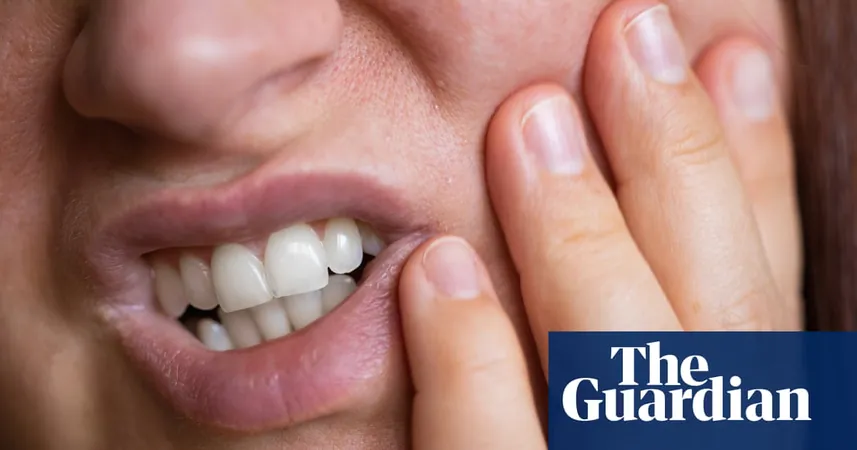
Is Your Jaw Clicking? Here’s What You Need to Know About This Often Overlooked Condition
2024-11-13
Author: Jia
As we navigate through our 30s, many people find themselves grappling not just with backaches or knee issues, but surprisingly, with jaw-related pain that seems to affect a significant number of adults. Some friends have reported grinding their teeth at night, necessitating the use of mouthguards, while others have resorted to Botox injections to alleviate discomfort in their jaws. This has led many of us to become acquainted with a term that’s found its way into conversations: the temporomandibular joint, commonly known as TMJ, which connects the jawbone to the skull.
The broader medical term for issues related to TMJ is temporomandibular disorder (TMD), a condition impacting the muscles and joints involved in jaw movement. According to Dr. Thomas P. Sollecito, a professor of oral medicine at the University of Pennsylvania, as many as 10% to 15% of adults face some form of TMD. Fortunately, most cases do not require medical treatment and may resolve on their own.
But how can you tell if that clicking sound in your jaw is indeed a sign of TMD, or just the result of an awkward sleeping position?
Understanding Temporomandibular Disorders (TMD)
TMD refers to a spectrum of disorders that affect the jaw system, encompassing issues with the temporomandibular joint, the surrounding muscles, and even headaches stemming from jaw strain. The symptoms of TMD are diverse; they may include a clicking or popping sound in the jaw, facial pain, worn teeth due to grinding, restricted jaw movement, and even secondary symptoms like headaches and earaches.
Interestingly, research indicates that women experience TMDs more frequently than men, although the reasons remain somewhat unclear. Some investigations suggest a possible connection between estrogen levels and TMD pain, and theories also propose that women may experience and react to stress differently than men, potentially contributing to their higher rates of jaw issues.
What Causes TMD?
TMD can arise from a variety of factors such as: - Physical trauma, like injuries to the jaw. - Genetic predisposition and anatomical factors affecting jaw alignment. - Lifestyle habits, including excessive gum chewing or consuming chewy foods such as bagels.
Moreover, TMD has shown correlations with chronic pain conditions, including migraines, fibromyalgia, and other chronic pain syndromes. Emotional factors play a significant role as well, with stress leading to muscle tension and teeth grinding, which only exacerbates jaw pain. Understanding the emotional context is often a critical aspect of treatment, as highlighted by Dr. Clark Stanford, who uses holistic evaluations that include assessing a patient’s stress and life circumstances.
Treatment Options for TMD
When it comes to treating TMD, experts generally recommend a conservative approach. For individuals who grind their teeth, a custom night guard is often the first line of defense. Additionally, self-help strategies—like jaw exercises, better sleep hygiene, and dietary adjustments—are often beneficial.
In instances where clenching is a significant issue, Botox injections may be suggested to alleviate tension in the jaw muscles. While surgical options, such as open joint surgery, are available, these are reserved for severe cases where more conservative treatments have been ineffective.
When to Seek Help
If you frequently experience jaw pain, it's advisable to consult with a healthcare professional. However, if your only experience with your jaw is an occasional clicking sound without pain, there’s generally no cause for concern. It’s estimated that about one-third of people occasionally experience jaw clicks without any accompanying issues.
In conclusion, while jaw-related discomfort can be a source of frustration, being informed about TMD and its implications can empower you to seek appropriate care and alleviate worries about your jaw health. If you're curious about further exploring this often overlooked condition, don’t hesitate to reach out to a dental or medical professional for guidance!




 Brasil (PT)
Brasil (PT)
 Canada (EN)
Canada (EN)
 Chile (ES)
Chile (ES)
 España (ES)
España (ES)
 France (FR)
France (FR)
 Hong Kong (EN)
Hong Kong (EN)
 Italia (IT)
Italia (IT)
 日本 (JA)
日本 (JA)
 Magyarország (HU)
Magyarország (HU)
 Norge (NO)
Norge (NO)
 Polska (PL)
Polska (PL)
 Schweiz (DE)
Schweiz (DE)
 Singapore (EN)
Singapore (EN)
 Sverige (SV)
Sverige (SV)
 Suomi (FI)
Suomi (FI)
 Türkiye (TR)
Türkiye (TR)